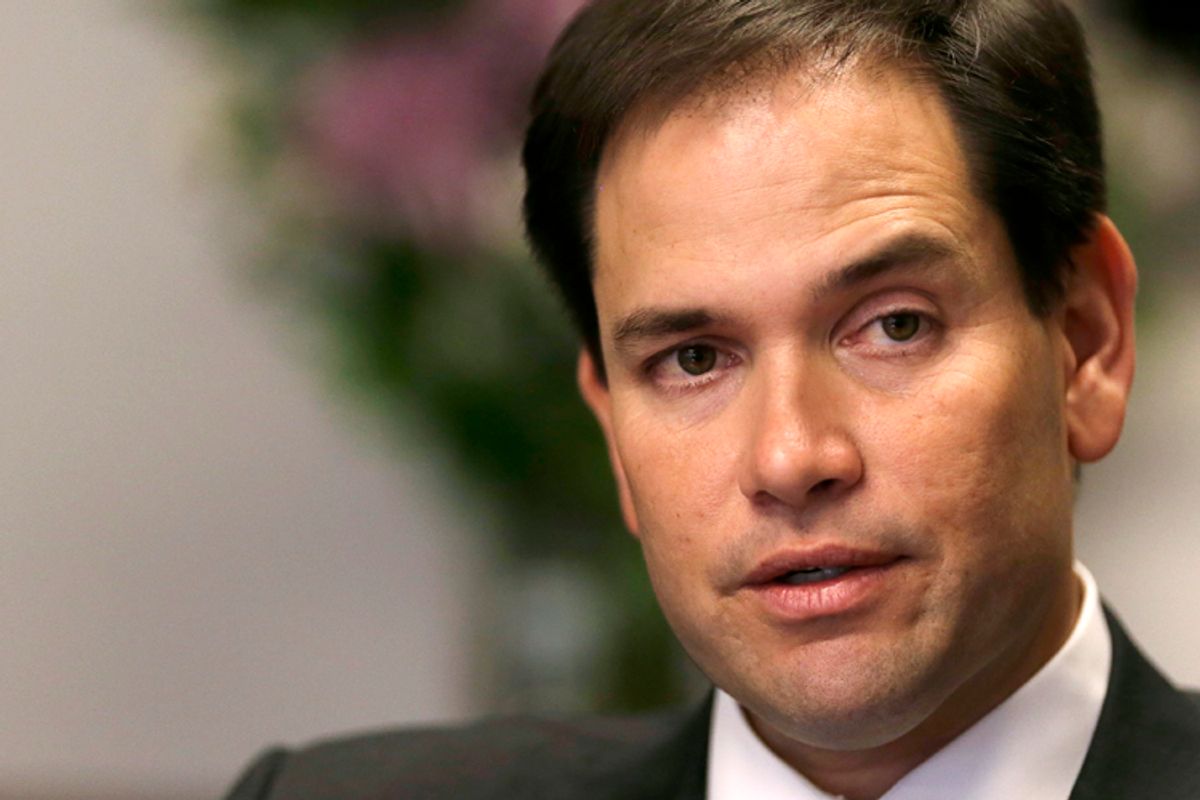The fight against ISIS isn’t going so well. The U.S.-led campaign of airstrikes against the Islamic State in Iraq has not prevented the group from making slow, steady progress throughout the province of Anbar as the Iraqi army continues to demonstrate its near-total uselessness. In Syria, coalition strikes against ISIS targets are mainly benefiting Bashar al-Assad, who has stepped up attacks on rebel groups now that he doesn’t have to worry so much about ISIS. And the airstrikes haven’t done much good there either – ISIS is pushing towards the symbolically important Syrian town of Kobani and will likely massacre civilians when they take it. The rebels themselves, meanwhile, are coming to resent the American-led coalition for its late-stage intervention that is only serving to empower their main enemy. The administration argues that they just need more time and, despite all indicators to the contrary, “this strategy is succeeding.”
No one really seems to be buying that. The lack of progress is, however, emboldening the increasingly agitated coalition of neoconservatives and war hawks, who clearly want to exploit the lack of immediate progress to inch the country a little further down the slippery slope and turn the war-that-isn’t-a-war against ISIS into a full-blown quagmire. Some of them, like Sen. Marco Rubio, are busily recalibrating their positions to make it seem like this has been their position all along.
On Monday, Rubio went on Fox News and tore into the administration’s anti-ISIS strategy. “This is what happens when your decisions on foreign policy are driven by politics,” Rubio said. “You cannot defeat an army on the ground simply from the air. And to put all your eggs in the basket of hoping that local ground forces will be able to do the job was a deeply flawed strategy from the beginning.”
Asked if he believed we should send ground troops to combat ISIS, Rubio said yes: “I do believe that we need to seriously begin to move forward on a plan that involves not just U.S. special forces operations, but Jordanians and Turks and Saudis and all these other countries to put some sort of ground element in place that can at least confront these guys.”
This represents a shift for Rubio, which isn’t surprising because he has taken almost every position possible when it comes to the administration and ISIS. In the past, Rubio hasn’t expressly advocated for the deployment of U.S. ground troops. Rather, he’s been adamant that the option not be taken off the table. “It's important for the President to be honest with the American people that at some point in the future, this might require some element of U.S. ground power in order to finish the job,” Rubio said on CNN at the end of September. Now he’s saying that the hypothetical commitment of U.S. troops should be a reality.
But that’s not all! For Rubio to say that the administration’s plan was “a deeply flawed strategy from the beginning” is incredible, given that Rubio advocated the same exact strategy in an op-ed for the Washington Post. Let’s do a little compare and contrast. Here’s the plan Rubio advocated in the Post, highlighted for clarity:
To confront the Islamic State terrorists, we need a sustained air campaign targeting their leadership, sources of income and supply routes, wherever they exist. We must increase our efforts to equip and capacitate non-jihadists in Syria to fight the terrorist group. And we must arm and support forces in Iraq confronting it, including responsible Iraqi partners and the Kurds. In addition, we must persuade nations in the region threatened by the Islamic State to participate in real efforts to defeat it.
And here’s what Rubio said on Fox News:
You cannot defeat an army on the ground simply from the air. And to put all your eggs in the basket of hoping that local ground forces will be able to do the job was a deeply flawed strategy from the beginning.
He called for a “sustained air campaign,” and he said that we should arm and equip local forces to confront them. Now he says that’s a bad idea and always has been? The administration did exactly what Marco Rubio said they should, and now that it hasn’t produced immediate results, Rubio is trying to pretend that he didn’t say any of those things.
Nothing he does on national security seems to make much sense. In many respects, Rubio seems to want to make himself out to be the hawkish counterpoint to someone like Rand Paul as they head into the 2016 nominating season. But he’s also made a show of backing the administration on ISIS, even as he attacks them for fecklessness and having a poor strategy, which was also his own strategy. Less than a month ago, just before he voted to authorize funding to arm the Syrian rebels, he called the administration’s plan to confront ISIS “better late than never” and identical to the plan “that I called for three months ago.”
The only constant feature of Rubio’s foreign policy thinking is its utter lack of consistency. His position on ISIS and Syria is altered on the fly and retconned as needed. It’s a strange thing to watch him try and establish himself as a credible voice on national security with all this erratic flailing about.



Shares